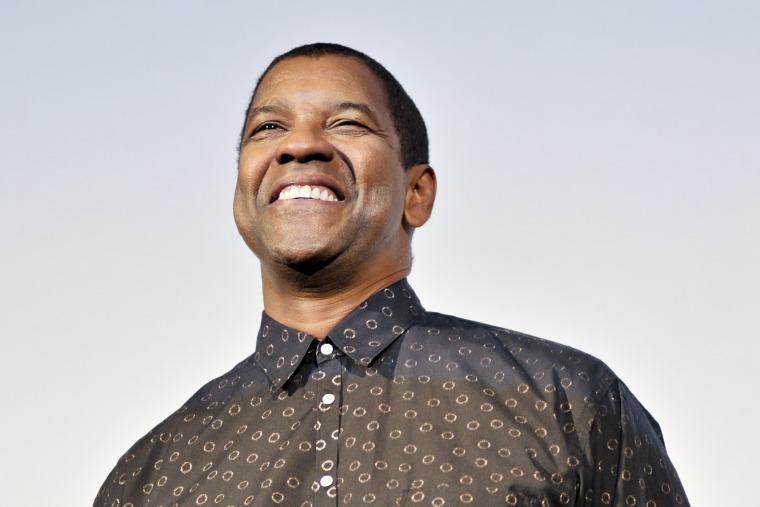The Harris Poll released its annual ranking of America's favorite movie stars on Friday, and for the second year in a row Democrats expressed their preference for two-time Oscar winner Denzel Washington.
The choice speaks volumes, especially considering the fact that Republicans' favorite actor, conservative icon John Wayne, hasn't made a film in more than 30 years. Washington has reached a similar iconic status, winning the coveted Cecil B. DeMille honorary Golden Globe award this month at age 60 for his undeniably stellar career in movies.
In some ways, Washington was an Obama-type figure in Hollywood. He broke the mold of what kind of parts could go to an African-American leading man, eventually diversifying his repertoire to include a vast array of heroes and villains, some based on true life characters and others that were initially intended for white actors. His films also tend to boast multiracial casts in non-stereotypical roles (think "Flight," for instance, which could have starred actors of any ethnicity), which have proven to have broad appeal, yet are still fairly rare.
Today, he is one of the most respected and bankable names in the movie business -- but why is he so popular with Democrats in particular?
RELATED: Why John Wayne remains an icon of the right
He's stayed mostly apolitical publicly since he became a breakout star in the 1980s, although he did endorse Barack Obama's candidacy in 2008. According to The Hill, he believes he needs to "know more" about the 2016 field before picking a favorite. But these five films may give more insight into why he is a favorite of Democrats than any of his official statements:
"Malcolm X" (1992): Spike Lee's acclaimed biopic about the controversial Nation of Islam leader was in some ways the culmination of a resurgence of black cultural pride and nationalism in the late '80s and early-'90s. The film played a significant role in redeeming Malcolm X's image in the public consciousness, without diluting the power of his unapologetic message of equality "by any means necessary." The commercial success of this film made it possible for not just other cultural heroes of the left to shine on the big screen, but it also presented a more nuanced and complex vision of what a black leading man could be.
"Philadelphia" (1993): Some elements of this Oscar-winning film may be dated now, but it's sympathetic portrayal of a gay attorney (played by Tom Hanks) fighting discrimination amid an HIV/AIDS diagnosis was downright groundbreaking in 1993. Washington has arguably the most nuanced role. He plays an ambulance chaser who must overcome his own deep-seeded homophobia in order to better understand how his client was railroaded. Washington's courtroom oratories in the film's last act are not just a master class in terms of performance, but also a subtle link between the rhetoric of the civil rights movement and the gay rights cause.
"Crimson Tide" (1995): In this tense submarine thriller, Washington plays something akin to a liberal fantasy of a military officer. His character, Lieutenant Commander Ron Hunter, is a thoughtful and appropriately cautious opponent of preemptive strikes, and he delivers an articulate case against toying with the concept of thermonuclear war. This film's primary conflict has him battling against a Dick Cheney-esque captain, played by a resolute Gene Hackman, who would rather shoot first and ask questions later when it comes to a potentially cataclysmic stand-off with Russian adversaries. SPOILER ALERT: Washington's cool-headed professionalism wins the day.
"The Hurricane" (1999): This biopic about the wrongful murder conviction of Rubin "Hurricane" Carter was dinged by critics over its inaccuracies, but controversy could not dilute the power of Washington's lead performance. The film portrays with elegant efficiency how an African-American man, even one with stature, can be railroaded by the criminal justice system. And although the Canadian do-gooders who seek to free him may be a little bit hokey, the broad strokes of the story are not. Washington's charisma is crucial in getting audiences to identify with the falsely imprisoned, something that doesn't happen often enough in real life, let alone the movies.
"John Q" (2002): Although decried by many critics as preachy to a fault, Washington's drama about a low-income father forced to take a hospital hostage in order to get a vital kidney transplant for his son was a hit with audiences. It also dramatized the case for universal health care before the topic became in vogue. Sure, it's premise and execution may have been a tad bit broad -- complete with bad-guy HMOs -- but underneath the melodrama was a reality that Americans then and now face, a desperate inability to handle the cost of care and a system that can be heartless to those without the means to pay.
Incidentally, Washington's next film will be an all-star remake of the classic 1960 western "The Magnificent Seven," (itself a reboot of Akira Kurosawa's "The Seven Samurai") a movie has been interpreted as liberal since it portrays a band of gunslingers united to protect a town of disadvantaged people being preyed upon by marauding bandits. Washington's version will hit theaters this September, just a few weeks before the general election.
